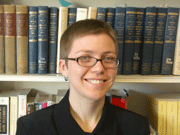Welcome
As a scholar of early modern religious and cultural history, I teach a broad variety of courses in Jewish history, early modern European history, and religious and cultural history of the pre-modern era. In my research I specialize in early modern religious and cultural history in Poland, focusing on the politics of the multifaceted topic of Jewish-Christian relations.
My first book, Jews and Heretics in Catholic Poland: A Beleaguered Church in the Post Reformation Era, published by Cambridge University Press in 2006 (pbk. 2009), integrates Jews into religious history of the post-Reformation Catholic Church in Poland and challenges the perception that the Catholic Church triumphed in Poland by demonstrating the superficiality of the re-Catholicization of the ruling elites, whose economic interests trumped their religious loyalties.
My new book, Sinners on Trial: Jews and Sacrilege after the Reformation (Harvard University Press, 2011) tells a story of affirmation of Catholic dogmas after the Reformation, not necessarily though religious education and propaganda but through the application of criminal law, and the courts' treatment of "the sacred" and, thus, also of the "sacrilege." My book combines political, legal, and cultural historical approaches. In Poland, the contest over the sacredness of the Eucharist, a major Catholic dogma challenged by the Reformation, became manifest in lay courts' adjudication of crimes against property and religious symbols, especially those linked to the Eucharistic rituals. The mishandling of sacred symbols and objects transformed sins into crimes and led to harsh sentences, including burning at the stake. Far more than the Church's efforts to educate the laity, the lay courts' classification of Catholic spaces as the only "sacred spaces" and their adjudication of crimes of "sacrilege," were crucial for the (re)Catholicisation of Poland, and the shaping of the country's religious identity. Sinners on Trial crucially casts a new light on the most infamous case of sacrilege, the accusations against Jews for stealing and desecrating the host, situating it within a broader context of the politics of crime -- most specifically that of sacrilege, illuminating its post-Reformation character, as well as differences between host desecration and ritual murder accusations.
My work has been supported by the Harry Frank Guggenheim Foundation, the Memorial Foundation for Jewish Culture, the Koret Foundation, YIVO Institute, and the Yad Ha-Nadiv Foundation (Israel), among others. In 2002, I was a Harry Starr Fellow at Harvard University. In the academic year 2007-2008, I was an Emeline Bigelow Conland Fellow at the Radcliffe Institute for Advanced Studies at Harvard University.
I have directed and edited the Early Modern Workshop project, an online resource for scholars and students of early modern history and Jewish studies (at http://www.earlymodern.org), which was supported by the Mellon Foundation, Library of Congress, Columbia University, University of Maryland, and Yeshiva University, and in 2009 also the Radcliffe Institute for Advanced Studies at Harvard University and the Memorial Foundation for Jewish Culture in New York.
In 2008, I was invited to join the editorial board of the AJS Review; and in 2009, the editorial board of the Sixteenth Century Journal, and in 2010 the board of Polin.


